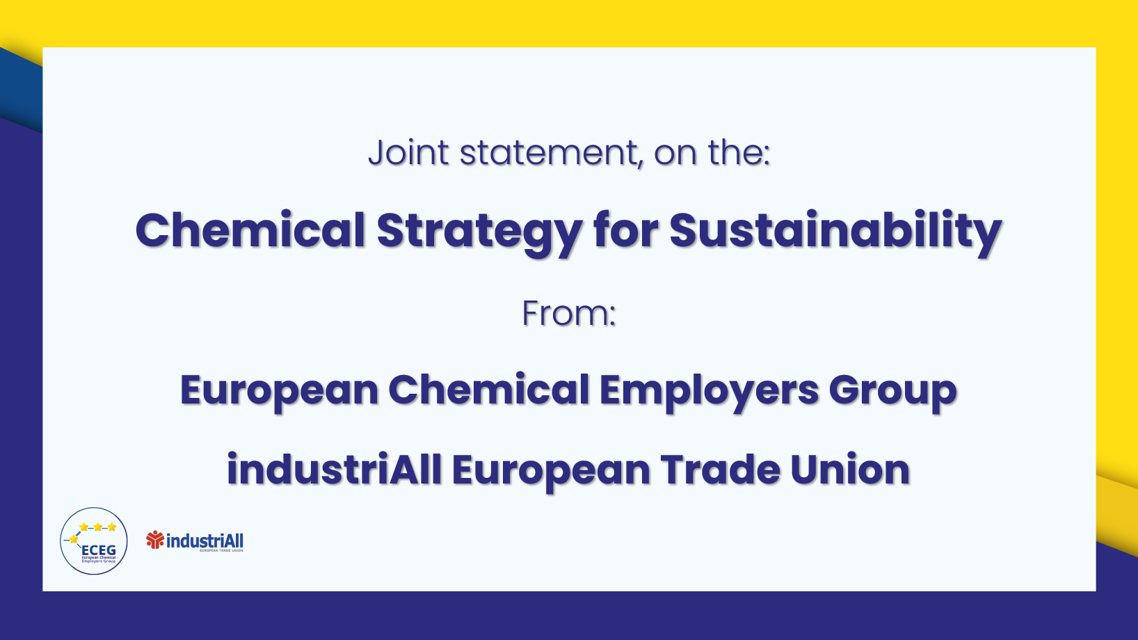Joint statement of the European Social Partners in the Chemical, Pharmaceutical, Rubber and Plastics Industries, the European Chemical Employers Group and industriAll European Trade Union, on the Chemical Strategy for Sustainability
The European Social Partners in the Chemical, Pharmaceutical, Rubber and Plastics Industries, the European Chemical Employers Group (ECEG) and industriAll European Trade Union Chemicals and chemical industry welcome the ambition of the European Commission to propose a comprehensive strategy for chemicals. Sustainability has three dimensions. Any strategy for sustainability should therefore equally address the ecological, social and economic aspect.
A balanced approach to these three dimensions is the basis for innovation and competitiveness. The maintenance and development of high quality employment in profitable companies are the prerequisite for a strong chemical industry in Europe: an industry that ensures strategic autonomy for Europe, that enables with its products the green and digital transformations, that provides essential substances and intermediate products for all other industries.
The responsible management of chemicals has always been a topic and concern of the European Chemical Social Dialogue. Since 2003, the Social Partners have continuously dealt with questions around the improvement of health and safety in this context. As in the past, we clearly commit ourselves to achieving highest standards.
The European Commission has repeatedly confirmed that the standards embedded in the European regulatory framework for chemicals, chemical products and protection of health and environment are among the highest in the world today. REACH in particular has become a model for regulatory systems worldwide. There is, however, room for simplification and enhanced transparency in order to meet the European Commission’s goal. “One substance one assessment” should be the ultimate goal.
ECEG and industriAll Europe remain willing to cooperate and advise the European Commission on all related aspects. We call on the relevant authorities to involve the Sectoral Social Dialogue in any further development of this framework.
ECEG and industriAll Europe wish to point out that the announced goal of “zero pollution” or a “toxic-free environment” is misleading. Depending on the amount, chemicals can be non-hazardous or hazardous. Even naturally occurring chemicals are never “non-pollutant”. In addition, it is unrealistic to think that industrial production can achieve this. Zero pollution would mean zero production and, in turn, zero employment and zero value creation. It would also be more useful to jointly determine the balance to be achieved between the dangerousness and efficiency of the essential chemicals.
A future proof chemical industry and sustainable chemicals management strongly depend on innovation. We therefore call on the European Institutions to provide a supportive framework for Research & Development & Innovation. But innovation depends on innovative people. industriAll Europe and ECEG regret that the Chemical Strategy does not pay more attention to the role of the workforce. A mere reference to training and upskilling is not enough. Attractiveness for potential employees, high quality working conditions, an increased number of graduates from STEM subjects and exemplary apprenticeships are just as important as continuous learning opportunities.In order to develop a sustainable chemicals strategy, the chemical social partners call for the following principles to be observed:
- acknowledge and strengthen the key role of the chemical and pharmaceutical industries with regard to health and safety and environmental protection and for the development of sustainable solutions to achieve the "Green Deal" objectives;
- acknowledge the potential of the industry as a driver for recovery and job creation
- build on existing chemicals regulation and the progress that has been made in its implementation;
- ensure planning reliability and a stable regulatory framework;
- recognise the risk-based approach in chemicals regulation and management;
- increase control of imports to ensure that they fulfil the same high standards.
The European Commission promises to establish a high-level roundtable with representatives from industry including SMEs, science and the civil society to realise the strategy’s objectives in dialogue with the stakeholders concerned. The European Social Partners in the Chemical, Pharmaceutical, Rubber and Plastics Industries welcome the establishment of such a group and request a seat at the table.
Signed:
Emma Argutyan, Director General of the European Chemical Employers Group (ECEG)
Luc Triangle, General Secretary of industriAll European Trade Union
Joint statement of the European Social Partners: EN, FR, DE
Contact: Andrea Husen-Bradley (press and communication), Maike Niggemann (policy adviser)

